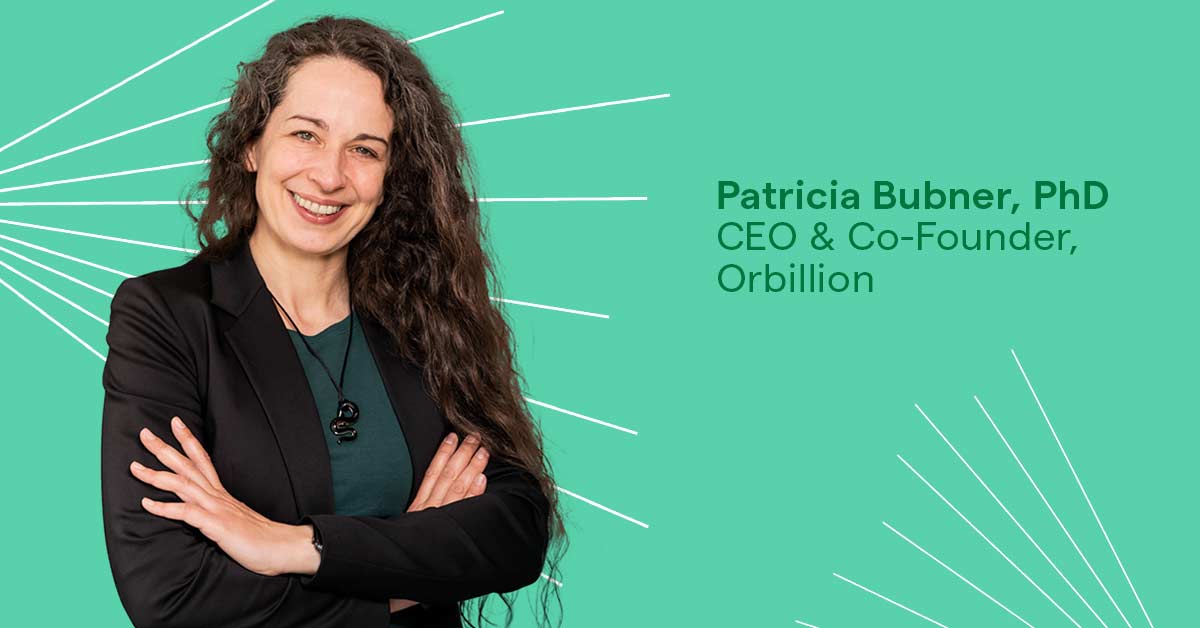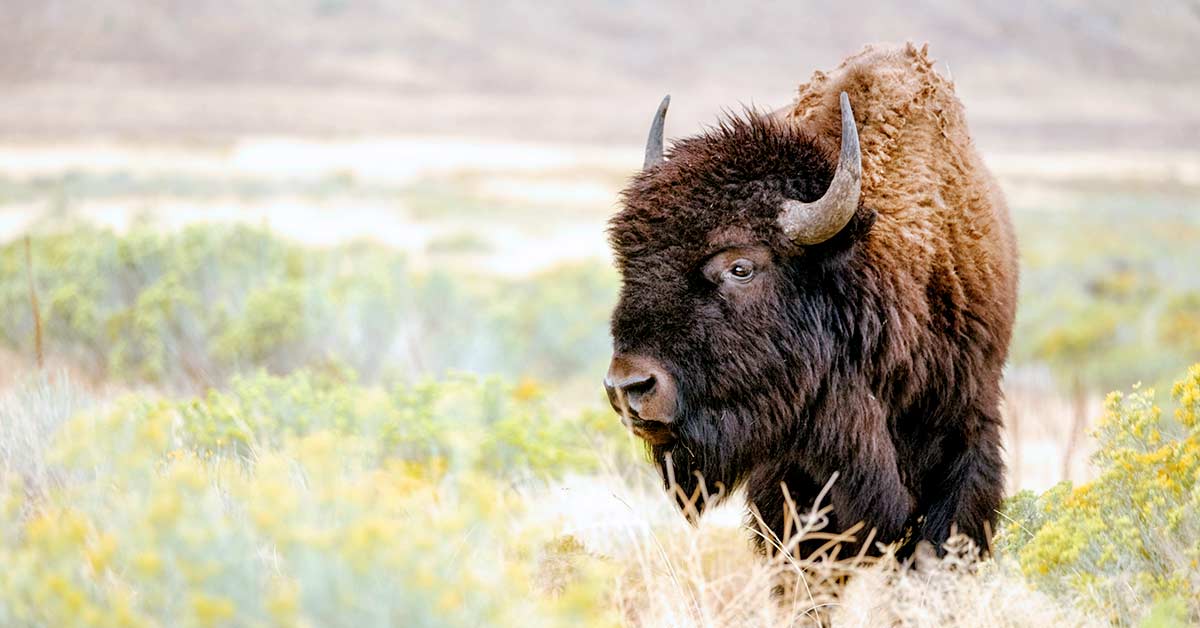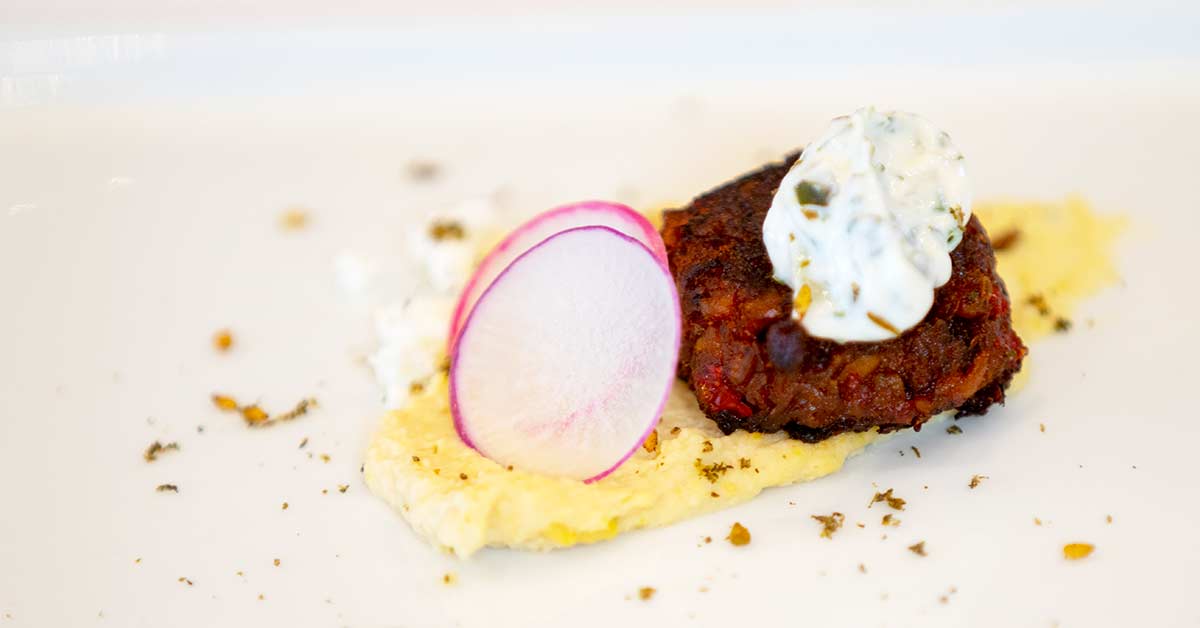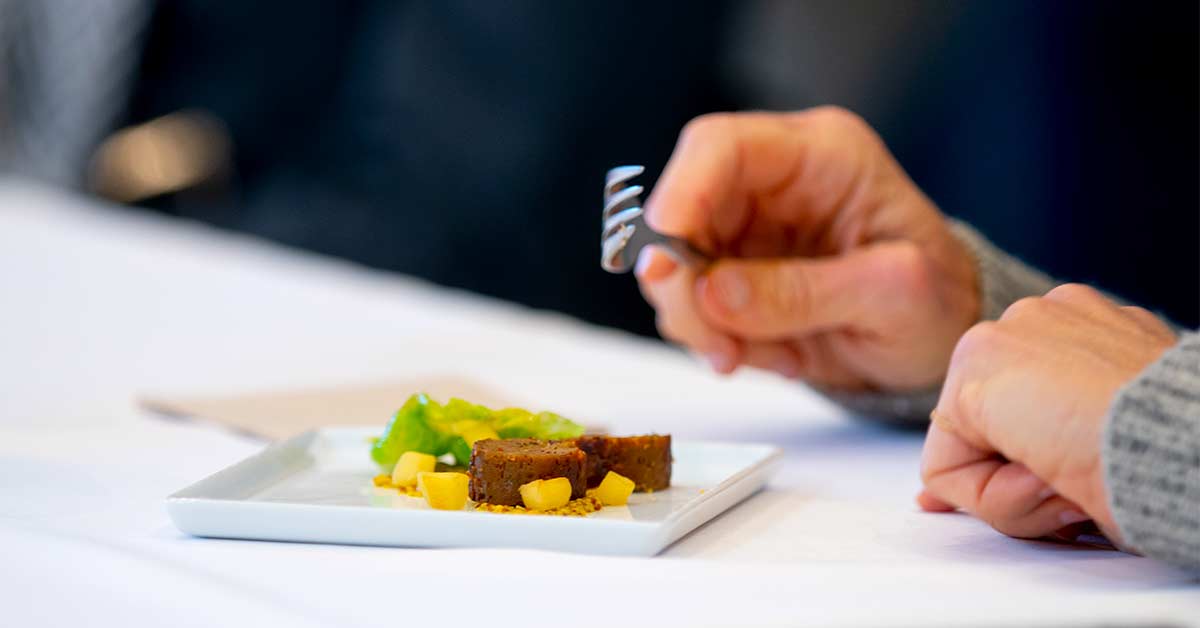December 22, 2021
Member Spotlight: Orbillion Bio

Orbillion creates meats we know and love, without the environmental, social, and animal harms we don’t.
Tell us the story behind Orbillion. How did you meet your other co-founders, Samet Yildirim and Gabriel Levesque-Tremblay, and how did the company begin?
Samet, Gabriel and I started Orbillion because we believe producing meat more sustainably and ethically also provides a way to make it more delicious, more interesting, and more exciting.
Coming from Austria, from a community surrounded by farmland in a country that takes pride in the heritage of animals raised for food, I have always thought about how food is made. Then, as a scientist, my questions started taking on new forms. I met Gabriel when we were postdocs at UC Berkeley, and we quickly became friends, connecting over both our love of food and how conflicted we felt given the food system’s impact on the environment and animals. Fast forward a few years, Samet and I were working together, talking about food production, about how biotech approaches could be used to address some of the worlds’ most intractable problems. More, Samet and I were working together on the very bioprocesses that could unlock one of the biggest issues with cell-cultured meat: scalability. Samet, Gabriel, and I connected and realized we were uniquely well-positioned to help the cause in a major way.
With greater awareness of the climate impacts of animal agriculture, particularly beef, changing consumer preferences, and younger people more open to new foods, the time was right for the three of us to start Orbillion.
Walk us through the science of your heritage meat products. What’s unique about the way Orbillion produces premium cell-cultured meat?
What’s unique about Orbillion is both how we’re making food and what type of food we’re making.
How we make it? First, we skillfully select a small sample of tissue from prized heritage animal breeds, leaving the animal unharmed and to go on living a long and happy life. Then, we place the sample in a safe controlled environment (a bioreactor), with just the right recipe of nutrients, so the sample can grow. From there, we develop the sample into the fat, muscle, and surrounding tissues to craft the flavor, nutrition, and tenderness we seek in our food. Finally, we craft meat into foods we know and love, to serve safe and flavorful food for all.
We focus on heritage animal breeds because we’re optimizing for delicious food experiences eaters can feel great about, and we’re working with farmers, building on their expertise, helping to retain the biodiversity of heritage breeds crafted over centuries.

Why must the world adopt more sustainable agricultural practices and how can individuals be part of the solution?
People love meat and they’ll continue loving meat with more and more people seeking out meat as our population grows to 10 billion around the world by 2050. Here in the US, 90% of households purchase meat, and despite the rise in plant-based alternatives, the US meat industry continues to grow—it grew by more than 19% last year. At the same time, we know the current meat industry isn’t sustainable—with greenhouse gas emissions, wasteful water and land use, serious animal welfare concerns—and we know that consumers are demanding change with 83% of US shoppers seeking meat that is better for them and their families, the earth, workers, and the environment.
The problems are urgent and vast. We believe all solutions should be on the table. We see cell-cultured meat as an exciting option for consumers seeking more sustainable alternatives and flavorful foods.
For individuals, well, firstly—we’re hiring! Check out our careers page and reach out. Even if you don’t see your dream job featured right now but want to join us, please connect with us. Beyond Orbillion, this is a new and exciting field with so much room to create and grow. I urge you to explore how your background, interests, and expertise can support cell-cultured meat.
Name your biggest challenge so far working in the food tech space?
Interestingly, the biggest challenges are just at the periphery of food tech itself. Our biggest challenge, and unknown variable, is consumer acceptance. There’s a lack of comparable products in the market as we’re creating a new food, while at the same time we’re creating one of the most intimately familiar and loved foods: meat. We need to convey this message in a way that is transparent and compelling, a way that is trusted, that consumers are comfortable with. This is a huge challenge for the field.
Another big challenge is the expectation of low-cost meat. The US subsidies on animal agriculture create unrealistically low-cost expectations that will be extremely difficult for cell-cultured meat to achieve. In fact, no one can achieve them! Not even intensive animal agriculture can achieve them, which is why they rely on such subventions.

From alternative proteins to plant-based products, we’re constantly inspired by food tech companies. What’s needed to grow this sector?
There is so much white space in this field. The supply chain for food grade ingredients needs to be established. I believe new tech may be used for this, for example, precision fermentation. For cell-cultured meat and seafood, we need stable cell lines from a variety of species and breeds.

What advice can you offer entrepreneurs hoping to follow in your footsteps?
Be open to feedback and stay discerning about the feedback you choose to act upon. Be persistent. Think big and learn fast. Make the best plan you can with the resources you have and then execute, execute, execute.
The problems are urgent and vast. We believe all solutions should be on the table. We see cell-cultured meat as an exciting option for consumers seeking more sustainable alternatives and flavorful foods.
What’s the hardest lesson you’ve learned in your career?
The hardest lesson I’ve learned in my career is about science itself. I’ve seen so many talented young scientists leave scientific fields because they don’t see role models that are like them. They think they don’t belong. And collectively, we lose the incredible potential of these great scientists. Given that, I believe we as professionals, as scientists, have the responsibility to be unapologetically ourselves. Being human and accessible and unique invites more brilliant minds into our fields. Diversity and inclusion are not nice-to-haves, they’re business and societal imperatives.

I believe we as professionals, as scientists, have the responsibility to be unapologetically ourselves. Being human and accessible and unique invites more brilliant minds into our fields.
We’re hungry to try Orbillion’s cell-cultured meat! How can our readers taste-test your products?
In March of 2021, we hosted an exclusive tasting with three of our four offerings. It was incredible to hear people’s reactions, to see the delight on their faces while enjoying our foods, especially after all our hard work. We are planning more tastings in the near future. Please sign up to join our waitlist at www.orbillion.com/connect. We can’t wait for you to try it!